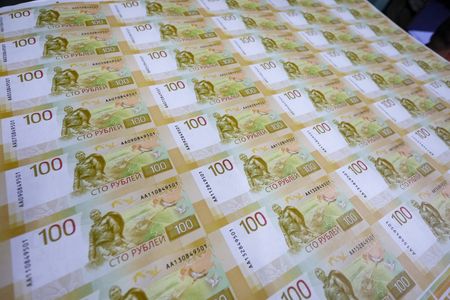(Reuters) – The Russian rouble pared early losses to gain ground on Monday in the first session since Moscow said it would suspend its role in the landmark Black Sea grain deal over the weekend.
Global food prices climbed on Monday after Russia said it was suspending participation in the U.N.-brokered grain accord for an “indefinite term” after what it said was a major Ukrainian drone attack on its Black Sea fleet in Crimea.
At 1230 GMT the rouble was up 0.3% against the U.S. dollar to 61.37, reversing earlier losses that had seen it down 0.6% in morning trading. The currency was flat against the euro at 61.10 and up 0.4% against the Chinese yuan to 8.37 .
The July grain corridor deal, which helped to unlock Ukrainian exports from its southern Black Sea ports, was the most significant diplomatic breakthrough so far in the eight-month-old conflict in Ukraine.
Kyiv and the West criticised Russia’s decision to ditch the agreement and analysts warned that this could cause another spike in global food prices.
Monday represented the final day of a domestic month-end tax period, which usually provides some support to the rouble. Monday was also the first full session after the central bank ended its rate-cutting cycle on Friday and said Moscow’s partial military mobilisation drive would be inflationary over the medium term.
“The end of the tax period and large dividend payments, coupled with a further decline in Russia’s trade balance, is likely to send the rouble in the direction of 65 (against the U.S. dollar) by the end of the year,” wrote Dmitry Polevoy, investment director at Moscow-based broker Locko Invest.
Russian stock indexes were up slightly.
The dollar-denominated RTS index had gained 0.2% at 1,116.2 points while the rouble-based MOEX Russian index was up 0.3% at 2,174.9 points.
(Reporting by Jake Cordell; Editing by David Goodman and Mark Heinrich)

